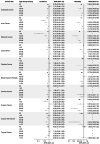Long-term use of low-dose aspirin for cancer prevention: A 20-year longitudinal cohort study of 1,506,525 Hong Kong residents
- PMID: 39825684
- PMCID: PMC12008822
- DOI: 10.1002/ijc.35331
Long-term use of low-dose aspirin for cancer prevention: A 20-year longitudinal cohort study of 1,506,525 Hong Kong residents
Abstract
Long-term use of low-dose aspirin has been demonstrated to reduce cancer risk, but the duration of necessary medication use remains uncertain. This study aimed to investigate the long-term chemoprotective effect of aspirin among the Chinese population. This population-based study included all aspirin users between 2000 and 2019. Aspirin users were age-sex matched with non-users at a 1:2 ratio. Cancer incidence and mortality were the main outcomes measured. Survival analyses with the Fine-Gray modelling were performed. The chemoprotective effects were measured by the sub-distribution hazard ratios (SHR) with control for the competing risks. A total of 538,147 aspirin users and 968,378 non-users were included, with a mean age of 64.8 years, 9,543,399 person-years of follow-up and 90% of users with 80 mg aspirin. The long-term use of aspirin was associated with a reduced risk of cancer (SHR 0.92, 95% CI 0.91-0.94) and a reduced risk of cancer mortality (SHR 0.80, 95% CI 0.79-0.82). Stronger chemopreventive effects were observed among those who used aspirin for more than 10 years, including risk reductions for lung (SHR 0.56, 95% CI 0.51-0.60), breast (SHR 0.34, 95% CI 0.29-0.38) and colorectal (SHR 0.37, 95% CI 0.33-0.40) cancers, but not for bladder cancer and leukaemia. Low-dose use of aspirin was associated with lower risk of cancer among Chinese. The association was even stronger for those using aspirin for more than 10 years. Prescription of aspirin may be started as early as at age of 40, as the chemoprotective effect also applied for early cancers.
Keywords: aspirin; cancer; cancer prevention.
© 2025 The Author(s). International Journal of Cancer published by John Wiley & Sons Ltd on behalf of UICC.
Conflict of interest statement
FC is the co‐founder, non‐executive board chairman, honorary chief medical officer and shareholder of GenieBiome Ltd. The company provides microbiome healthcare services and products including M3CRC and G‐NiiB Immunity formulas to tackle a myriad of diseases, including the post‐novel virus conditions such as difficulty in sleeping, which FC is not involved in any business negotiation process. SC received research funds from Celleron, Genorbio, Ipsen, received consultation fees from Astra‐Zeneca, Eisai and MSD; received honoraria for lectures from Astra‐Zeneca, BMS, Eisai, Ipsen, MSD and Roche; received travel support for attending meetings from Ipsen, Roche, Eisai, Astra‐Zeneca and Novartis. Other authors declare no competing interest.
Figures


References
-
- Bosetti C, Santucci C, Gallus S, Martinetti M, La Vecchia C. Aspirin and the risk of colorectal and other digestive tract cancers: an updated meta‐analysis through 2019. Ann Oncol. 2020;31(5):558‐568. - PubMed
-
- Santucci C, Gallus S, Martinetti M, La Vecchia C, Bosetti C. Aspirin and the risk of nondigestive tract cancers: an updated meta‐analysis to 2019. Int J Cancer. 2021;148(6):1372‐1382. - PubMed
-
- Rothwell PM, Wilson M, Elwin CE, et al. Long‐term effect of aspirin on colorectal cancer incidence and mortality: 20‐year follow‐up of five randomised trials. Lancet. 2010;376(9754):1741‐1750. - PubMed
-
- Rothwell PM, Fowkes FG, Belch JF, Ogawa H, Warlow CP, Meade TW. Effect of daily aspirin on long‐term risk of death due to cancer: analysis of individual patient data from randomised trials. Lancet. 2011;377(9759):31‐41. - PubMed
-
- Skriver C, Maltesen T, Dehlendorff C, et al. Long‐term aspirin use and cancer risk: a 20‐year cohort study. J Natl Cancer Inst. 2024;116(4):530‐538. - PubMed
MeSH terms
Substances
Grants and funding
LinkOut - more resources
Full Text Sources
Medical

